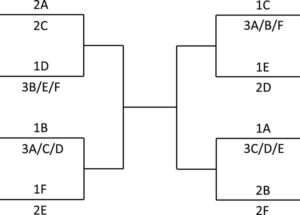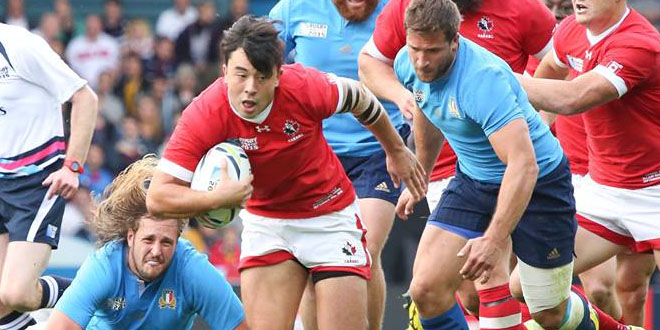The Men’s Rugby World Cup may expand from 20 to 24 teams. The possibility has been raised and debated for a long time by rugby supporters. It may change for RWC 2027 in Australia, but RWC 2031 in the USA is more probable. What would a 24 team Rugby World Cup look like?
24 team Rugby World Cup Format
The inaugural Men’s Rugby World Cup in 1987 was a 16 team tournament. The model was changed to 20 teams in 1999 and reconfigured for RWC 2003. The five pools of four model first used in 2003 has been used ever since. Under the model eight teams advance to the Quarter finals.
A 24 team Rugby World Cup would be different. It would mean an even number of competitors per pool. It could come in two varieties – (a) four pools of six teams or (b) six pools of four teams. Under (a) there would be added time for the pool phase but no change to the knock-out stage. Under (b) there would be an additional elimination round (8th finals or round-of-16) with pools reduced from five to four competitors each.
The (b) option is likely to be preferred over (a). One reason is that it would not be longer than the current number of days required for a tournament. Another is that the symmetrical structure would place greater focus on positivity and less on negativity. There would be fewer matches for pride and more for a place in the play-off’s. For instance, Tonga’s historic win over France at RWC 2011 came after Tonga had been eliminated; France was assured of a place in the play-off’s.
With the 24 teams divided into six groups of four, there would be play-off’s places for sixteen of the twenty-four competitors. An incentive to win ones group is that under the round-of-16, group winners receive favorable matches against group runners-up play or third-placed teams.
Sample pools are shown in the table below.
| POOL A | POOL B | POOL C | POOL D | POOL E | POOL F |
| Australia | South Africa | England | France | Ireland | New Zealand |
| Scotland | Italy | Georgia | Japan | Wales | Argentina |
| Fiji | Samoa | Tonga | Uruguay | USA | Spain |
| Portugal | Russia | Canada | Namibia | Romania | Chile |
PLAYER WELFARE
24 teams means a simplified structure. An odd number of teams per pool makes it impossible to allocate even playing dates. If two matches from the same pool take place on the same day then one team will always have a bye.
With four teams per pool the matches can be on the same day. Super match days of four games would be possible without any team having less time than a rival. Six pools would facilitate the spread of matches on weekdays. Different pools could be allocated different match days with marquee matches slotted on prime days.
Week one for Pool A could see matches on Tuesday in the form of Australia vs Fiji and Scotland vs Portugal. Game day two for Pool A could be the following Monday with Australia vs Portugal and Scotland vs Fiji while game day three could be Australia vs Scotland and Fiji vs Portugal on Sunday.
Pool D could begin on the opening Saturday with France vs Japan and Uruguay vs Namibia. Game day two could be six days later with France vs Namibia and Japan vs Uruguay. The pool could conclude with Thursday fixtures.
Opponents of expansion will look at Pool F and say Spain and Chile will be hammered by New Zealand. This may be accurate; then again, is it really different to the RWC 2023 pool wherein New Zealand face Uruguay and Africa 1 (likely Namibia)? The change is Argentina instead of France and Italy. The comparable match to New Zealand vs Italy would instead be in the round-of-16. Based on the above pools that match could be New Zealand vs the loser of Ireland vs Wales.
KNOCK-OUT STAGE
The knock-out stage of a 24 team Rugby World Cup could look like the model shown below.

Australia played Wales, Georgia, Fiji and Uruguay at RWC 2019. The Wallabies will play a similar pool in 2023 and also did so in 2015. With six pools, repetition is less likely. The above model shows different but comparable rivals. If Australia were to win the group they would be 1A followed, arguably, by Scotland as 2A and Fiji as 3C.
The format would add increased meaning to the pools. Australia would face the best third placed team from Pool C, D or E. It would depend on points. In theory it would be one of Tonga, Uruguay or the USA. However, it could also be Canada, Namibia or Romania. Tonga vs Canada would be a clear loser-goes-home match within the pool stage.
Under the same pool scenario if Scotland were 2A then this would place them against the Pool C runner-up. Evidently, Georgia gain from this model. So do England who would have the focus of going unbeaten against Georgia, Tonga and Canada in their group. In addition, facing Georgia, in the round-of-16, rather than being eliminated under the existing 5 team per pool format, would be in the interests of Scotland.
The winner of a Scotland vs Georgia round-of-16 match would face the winner of 1D vs 3B, 3E or 3F. This possibility decreases the certainty over who faces who. This suggests a rise in interest as it would be harder to predict who faces who. Would France face Samoa, the USA or Spain? Or would an upset mean it is a team listed as 4th in these pools?
 Americas Rugby News Rugby news from across the Americas!
Americas Rugby News Rugby news from across the Americas!




